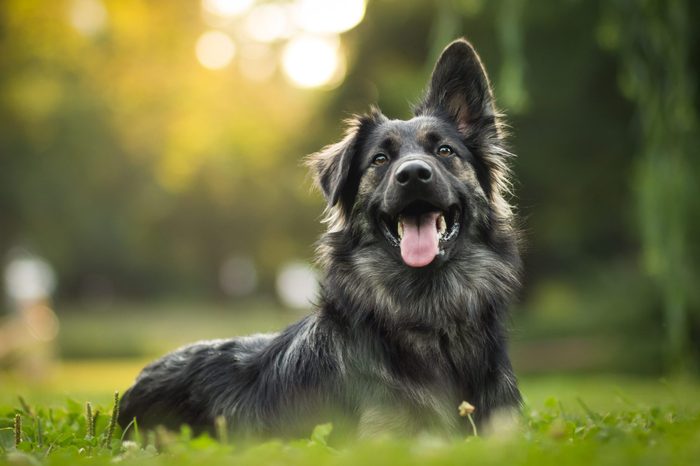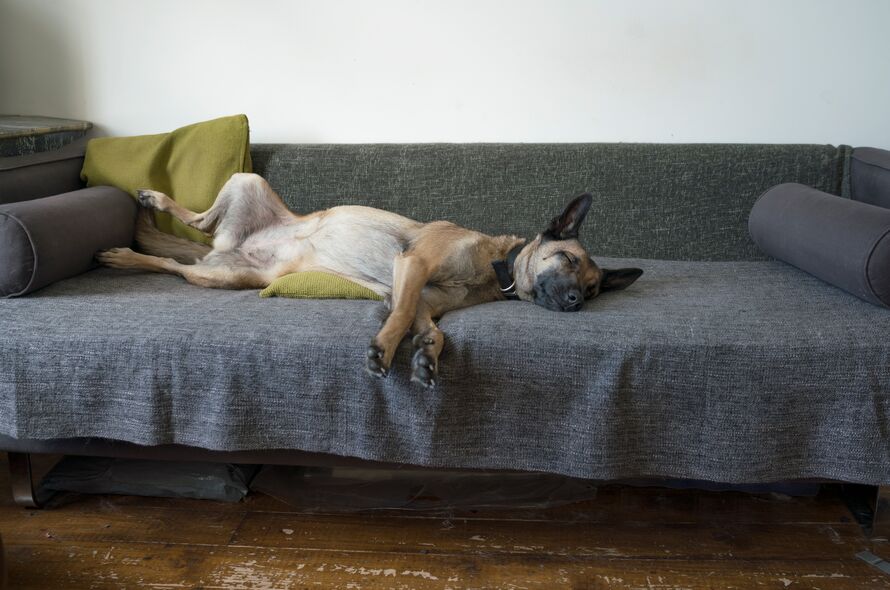
Dogs are playful, sociable animals. Encourage positive behaviour by giving your dog safe toys and regular opportunities to play with people or other friendly dogs. Make sure they have enough to do so that they don’t become distressed or bored.
Exercise is essential for all dogs. It helps keep them in shape but is really important for their mental health, too. It’s so important that all dogs get a daily walk to keep them happy and healthy.
Getting out and about keeps your dog’s brain active and is great stress relief for them. In fact, many behavioural problems can be attributed to boredom. When dogs are bored, they start to bark, dig, and chew on your stuff. Therefore, it is crucial to keep your pup active.
Challenge your dog!
Dogs are full of energy and naturally curious. Teach them new tricks, play fetch, or hide things around the house for them to find. You can also take them outdoors and introduce them to new people and other dogs.
Undoubtedly, dogs love to sniff and explore so make sure your dog has plenty of opportunity to just… well… be a dog!
Playdates
Dogs are very much social animals and love playdates and going to the dog park. Another form of positive reinforcement could be trips to the dog park for playdates or trips to other homes for playdates.
If they have a good day or a good week, you can tell them that and then take them to see their friends.
Dogs are routine-oriented animals, and change tends to stress them out. Consistency lets dogs know what’s expected of them, says the British Kennel Club. Establishing a routine for your new puppy will not only satisfy his habitual nature, it will also help him fit in with your family, leading to less stress for everyone involved. Think about it. If your pup isn’t conditioned to eat, sleep, play and relieve himself at times that work for the entire household and is instead left on his own to decide when these things should occur, you’ll likely become frustrated with the little guy. This could lead to even bigger behavioural problems down the line.
Spend time together
Dogs do not like to be abandoned or neglected so make sure you spend quality time together regularly. Dogs are also more likely to follow you if you are calm instead of using an abrupt voice.
What your dogs eat can affect their behaviour. Anxiety, hyperactivity, irritation, and being destructive can be directly linked to eating the wrong food. Stick to set meal times and discourage people from giving your pet food every time they beg. Resist feeling guilty when your pup shows their cute ‘begging for food’ face.
– The right diet keeps them slim, healthy and in good condition –
The proper balance of nutrients is essential when feeding your dog. Animals (and humans) need a certain combination of protein, carbohydrates, fats, vitamins, minerals and water every day in order to function normally. Balanced nutrition is no accident – pet food manufacturers work hard to determine the exact formula that goes into their products so that they provide everything your dog needs on a daily basis.
Encourage positive dog behaviour by using a ‘praise and reward’ system. Every time your furry friend shows good behaviour, give them a reward. Don’t limit it to treats that they can eat. Praising them with your words, cuddling and petting them are also effective (and free) rewards.
A well-trained puppy is a dream for any new pet parent. With proper training, dedication, consistency, and showering them with even more love, your four-legged, pawsome companion will always be on their best behaviour.
Alternatively, experiment to discover which toy your dog likes to play with; which words, tone of voice and body language elicit a positive response from your dog. Work out where they like to be touched. These are all critical in being able to motivate your dog to do something, and then in rewarding them once it’s done. Be imaginative when you’re training your dog – their biggest reward may be to perform tricks for you, to go swimming or out for a walk with you – these can also be used as rewards when feasible.
Some dogs are naturally hyperactive. You get up, and they’ll get up too, wanting attention. This is a type of attention-seeking behaviour, and as pet parents, we may find it endearing at first and we reward it with affection…until it gets too much to handle. This gives your dog the impression that they automatically get cuddles or pets every time they do this.
Don’t interact with them in any way or make any comment when this happens. Instead, catch them relaxing quietly and give them a treat or affection so they will know that relaxing is a good behaviour deserving of a treat.

Share this post with your friends and family
Follow Us for updates, info and tips
Developed by GW 'The Marketing Guy' | All Rights Reserved | © 2024 WildWash

Join our email list to stay up-to-date about the latest products and offers, plus get
10% OFF
your first purchase.
By submitting, you agree to receive marketing emails for information on news, promotions, and offers from WildWash. For more details see our Terms & Conditions and Privacy Policy. You can unsubscribe at anytime.
